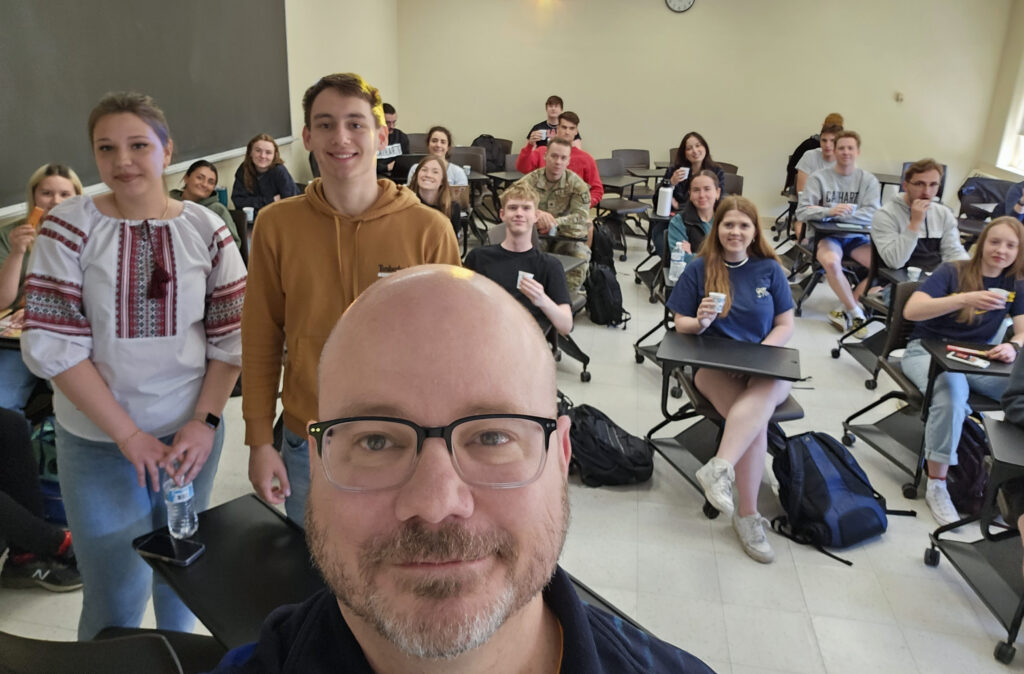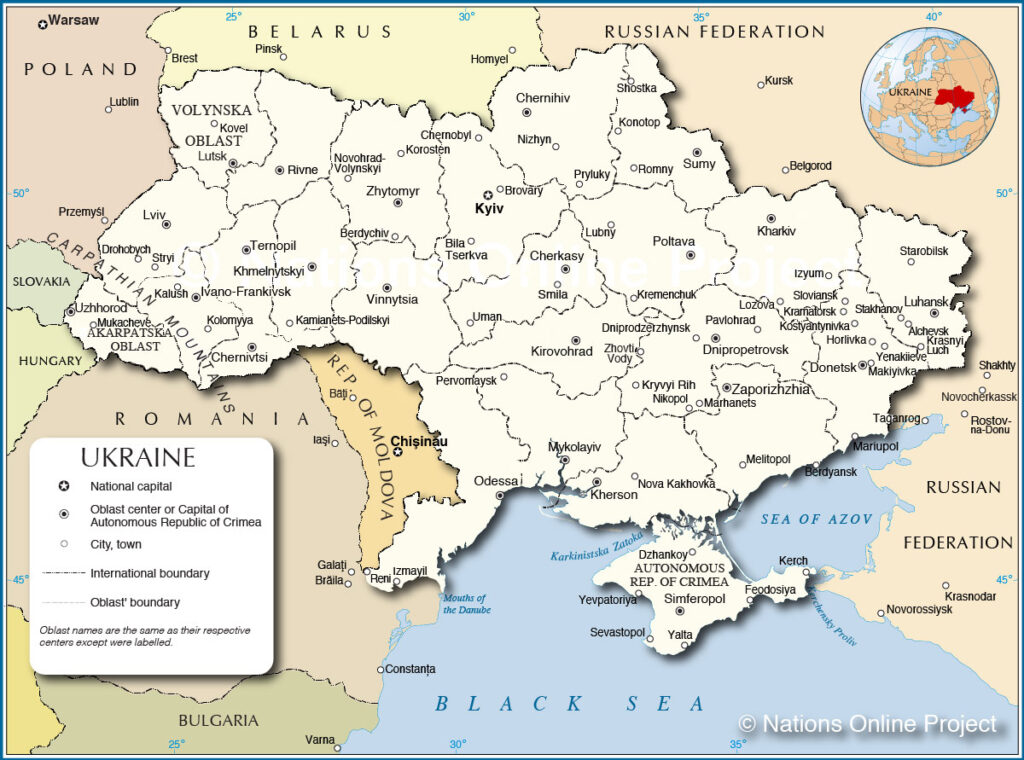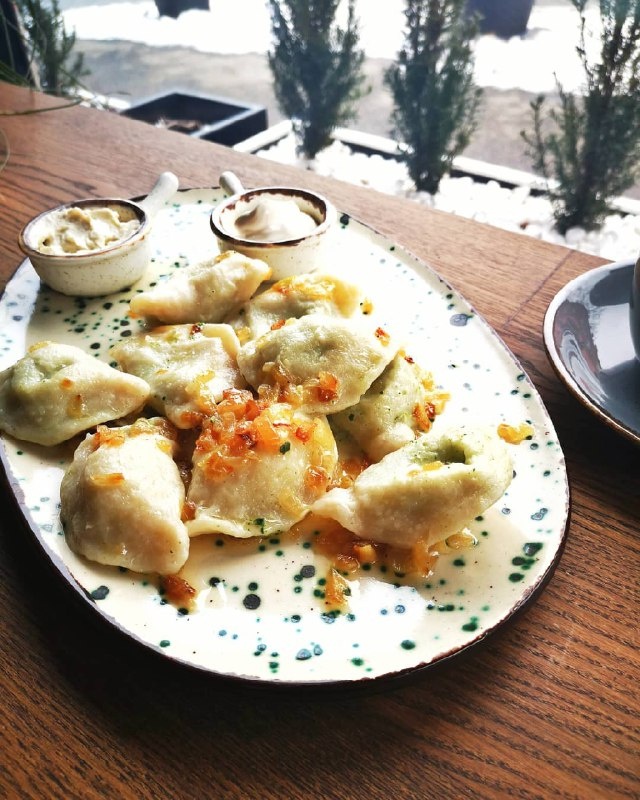On May 4, 2023, HST 330: A History of Ukraine, taught by Professor Stephen Norris, welcomed two guests from Ukraine. Vasyl Norenko, originally from Odesa, is a freshman studying computer science at Miami. Daria Poprotska is a first-year Master’s student originally from Donetsk studying Educational Leadership. This interview from that class session has been edited for length and clarity from a transcript provided by Lennon Isaac, a student in HST 330.
Stephen Norris (SN): We have focused on stories and on Ukrainian voices this entire semester. More recently, we have read stories about the war that began in 2014. Can you tell us your own from 2014-2022?
Vasyl Norenko (VN): I’m from Odesa, but I was living in the outskirts of Kyiv when the war broke out. I returned to Odesa after February 24 before leaving Ukraine when Russian forces began to shell that city. I took a train to the Hungarian border, then made my way to Poland. From there I started to look for places to study in the United States, Canada, or Europe. Sara Dougherty, a Miami graduate and former Peace Corps volunteer who had lived with my grandmother in the Odesa region, contacted me and told me about Miami. Fortunately the Global Initiatives office was able to accept me last summer as a transfer student without actually having any credits to transfer, allowing me to study here.
I was 17 when the war broke out and I felt like I could stay in Ukraine, but I didn’t want my family to worry. The night before the war started, my friends and I were talking about whether or not Russia really would invade. My friends all said they would not; I said they would. I wish I had been wrong about being correct on this prediction! I left Ukraine for my family because I didn’t want them to worry about me. My parents and grandmother are still in Ukraine, but my siblings are in Canada: we try to stay in touch as often as possible.
As far as the memories of February 24, 2022, I woke up to the sound of rockets at 5 AM, thinking they were fireworks. I soon realized the war had started.
Daria’s Poprotska (DP): I too woke up at 5 AM on February 24, but the sounds of the rockets were already familiar to me because I had heard them in 2014, when I was in my hometown of Donetsk. We had to flee that year to Sloviansk, about two hours away. By 2022 I thought nothing worse could happen but I was wrong. Even though the full-scale invasion began in February I stayed in Sloviansk until April. The Russian government claimed their purpose in the war was to annex the Donetsk and Luhansk regions, but then Russian troops captured Izium, which was nearby. We heard stories of atrocities there and saw how the city was bombed. My father, who is in the military, called us and told my mother and I to leave: he knew what was happening in Izium could happen to Sloviansk. My mom and I objected and didn’t want to leave at first, but the sound of bombs going off by our house made us live in fear and took a toll on my mental health, so we decided we had to go. We made that decision in about an hour as bombs were going off.
Our journey out of Ukraine took 30 hours: we took a train to Lviv, then a bus to Poland, then another train to Berlin. The train was so packed full of people we could not sit down for the entire time. Once we got to Berlin, a very kind host family took us in. Although it was difficult to think about leaving my mom, I started looking into schools in the United States. It had long been a dream of mine to earn a Master’s degree at an American university: the war, however, made me conflicted about this dream. In the end, I received a fellowship to come here to Miami. My parents both convinced me to go.
My memories of February 24 and immediately afterwards are associated with trying to walk my dog in between air raid sirens. Fortunately my dog is safe with my mother in Germany.
SN: How would you define what it is to be Ukrainian?
VN: For me, belonging to a nation is connected to land, to culture, and to history. I grew up on stories about Cossacks, particularly Bohdan Khmelnitsky and Ivan Mazepa. Even though Ukraine was not yet a nation in their time, the Cossacks established a state on Ukrainian land, had their own culture, and understood themselves as separate from the Poles and Russians. They established the historical heritage and national understanding that became our Ukrainian identity. And of course famous natural landmarks such as the Dnieper River also come to mind when I think of what it means to be Ukrainian.
DP: For me being Ukrainian is associated more with our food, which I think is the best in the world, and the hospitality we have where we welcome everyone to our homes and tables. Whenever someone visits, we prepare a huge feast. But Ukraine today is also a place where you can see the past and the present, where old churches and new glass buildings coexist. In fact, I am wearing a vyshyvanka, the embroidered national shirt of Ukraine, with jeans and sneakers today. I normally don’t wear a vyshyvanka for everyday purposes, but decided to wear it for today’s class. So I am combining tradition with contemporary styles: that’s what Ukraine is for me.
SN: How did you learn Ukrainian history in school?
DP: For me these are already old memories: I finished regular school in 8th grade because of the war starting and forcing us to leave Donetsk for Sloviansk, so my memory is not as good. But my history classes before that stressed Ukrainian history alongside world history: for me Ukraine’s history started with Kyivan Rus’, with Voloydymyr the Great and the adoption of Christianity, but also with the history of the ancient world.
VN: My memories are more recent, so I can remember starting Ukrainian history with the Trypillian culture, one of the ancient civilizations in present-day Ukraine. We started with these first civilizations and ended with the modern era. But what was stressed was that many cultures and religions have been a part of Ukraine’s history—Muslim, Jewish, Catholic, Orthodox, and more. For me Ukraine’s unique identity is a result of these different cultural, political, and religious influences leaving their traces.
SN: We have used a cultural history approach in this class, one that has allowed us to read Ukrainian poets, writers, and historians, as well as listen to Ukrainian music and watch clips from Ukrainian films. What shows, movies, books, or music would you recommend?
DP: I love the old adaptation of Nikolai Gogol’s Evenings on a Farm Near Dikanka: I have always been interested in Gogol’s folkloristic stories full of witchcraft and sorcery.
[ed: The film translated into English as The Night Before Christmas and is available through sovietmoviesonline.com]
VN: I would definitely watch Sergei Parajanov’s films Shadows of Forgotten Ancestors (1965) and The Color of Pomegranates (1969). I first heard of them in school, got interested in them, and then looked them up.
Matthew Huller (undergraduate assistant): What was your relationship with the Ukrainian language growing up in Donetsk and Odesa?
DP: Everyone tended to speak Russian in Donetsk, although Ukrainian was the official language. I learned both Ukrainian and Russian as a result. I spoke Russian in part because my grandparents only understood Russian.
VN: My mom went to university in Lviv, so I was raised with the Ukrainian language and I prefer to speak Ukrainian. But I also learned Russian because living in Ukraine is one where you live in a bilingual environment.
Autumn Marshall (student): Do you have any memories of Euromaidan?
VN: Well, I was only 10 years old in 2014 so my memories are mostly from watching events on television. But certainly I remember it was a major event.
DP: I remember Euromaidan well because my father is in the military and was in Kyiv to protect Ukrainian citizens. We were all worried about him. After he returned home months later, I was struck by how gray and wrinkled he had become: the events aged him.
Alyssa Benson (student): How was the Holodomor taught in your schools? Did you hear any family stories about the famine?
VP: I don’t have any family stories about the Holodomor, but I certainly know people who learned about it from family members and through the stories of family members who died. We of course learn about it in school, in our history classes, but also from the annual commemoration day in November. It’s a topic you always encounter now in Ukraine.
DP: I was also taught about the Holodomor in school, but my grandmother also told me about her own experiences and how she survived the famine. It’s why she always tells me to this day to eat everything on my plate.
Hannah Kiperman (student): What do you like to serve your varenyky [dumplings] with? My father is from Odesa and we always have them.
DP: Sour cream for sure.
VN: You could also serve them with vinegar.
DP: I also love pyrizhky [pies], particularly when they are filled with fresh strawberries or cherries.
Julia Brannon (student): What are your favorite traditional Ukrainian foods?
DP: Salad Olivier. I know it does not sound good to most Americans—it has sausage, pickles, potatoes, eggs, and other vegetables—but it’s delicious and always makes me think of home. I also love okroshka, which is a soup a lot like salad olivier, but one made in summer, sometimes with mineral water, sometimes with kefir.



